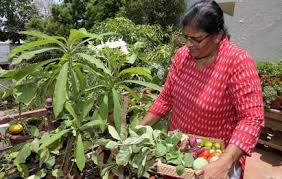
Monsoon, a season to rejoice in a kitchen garden teeming with veggies
By Erfan Khan
Islamabad: The Monsoon waves have started penetrating into the country’s horizons in the month of July and soon the moisture laden air will grip most of the country including the twin cities, thus creating an ideal atmosphere for seasonal plantation.
Myriad varieties of fruits and vegetables can be sown during the season, when the hovering danger of sun blight is almost over, the abundance of moisture in the air and soil after the expected drenching monsoon season will help in fast growth of hybrid and local vegetable seedlings.
The local grafted fruit plants including peach, apricot, plum, orange, mango, citrus, lemon, jamun, Japanese Persimmon, guava, phalsa (grewia asiatica) etc, besides, different kinds of grapevines including Black Prince, Red Rubby, Kishmish, Gola, Chinese white and if provided with ideal environment and protection, the much sought after Sundar Khani can be successfully cultivated in partial shade.
These grapevines are available with seeds or seedless varieties costing Rs. 300 to Rs.1000 depending upon the size of grapevine.
The white apple plant is also an exception in the hilly terrain of Islamabad which can adequately bloom if provided partial shade from scorching sun of summer season.
On the veggie front, heat tolerant gourds, pumpkins, bottle gourd, okra, aubergine or brinjal, green chillies, capsicum, tomatoes, onion and squash can grow rapidly in a soil well prepared with organic or mulched ingredients. Hybrid seeds easily available in twin cities should be preferred for their sustainability and growth.According to
agri-experts, these veggies plants will go on yielding a plenty till October.
As the passion for growing kitchen garden has intensified worldwide, the same trend has also gripped the residents of the twin cities. According to Liaqat Khan, caretaker of Mardan Nursery, the kitchen gardening requires a small stretch of fertile land and if you are not lucky to have it, proper mud pots and wooden crates could do wonders.
“Like in Egypt, rooftops could be utilized for growing seasonal vegetables. Such a fad though could be patience bearing business, but the outcome is tremendous and bringing down the expenditures of your kitchen expenses,” Professor Sharafat comments.
A man can be elated to have a dish full of fresh veggies or fruit free from chemical fed varieties or grown on contaminated water.
Such healthy changes in the modern lifestyle also prompted mushroom growth of nurseries and green houses, offering numerous choices. More than a dozen nurseries on the Islamabad Highway near PWD chowk offer attractive fruit saplings brought from places like Swat, Mardan, Peshawar, Nowshera, Sargodha, Khanpur, Larkana, Kashmir and Balochistan.
Mulazim Hussain, a pride owner of a nursery-cum-garden spreading over three kanals of land at Sihala, said that he got ample and regular supply of fruits and vegetables, adequately meeting his domestic as well as business requirements.
Sharing his experience, he advised that residents should switch over to growing these daily use edibles at homes with proper planning and space utilization.
Zareen Gul, a sturdy looking gardener in his grey years, shared another tip from his years long experience that yearly rotation of vegetables, proper trimming and grafting of fruit trees, sunlight, irrigation and use of home prepared recipes for repulsion of pests can contribute a lot.
